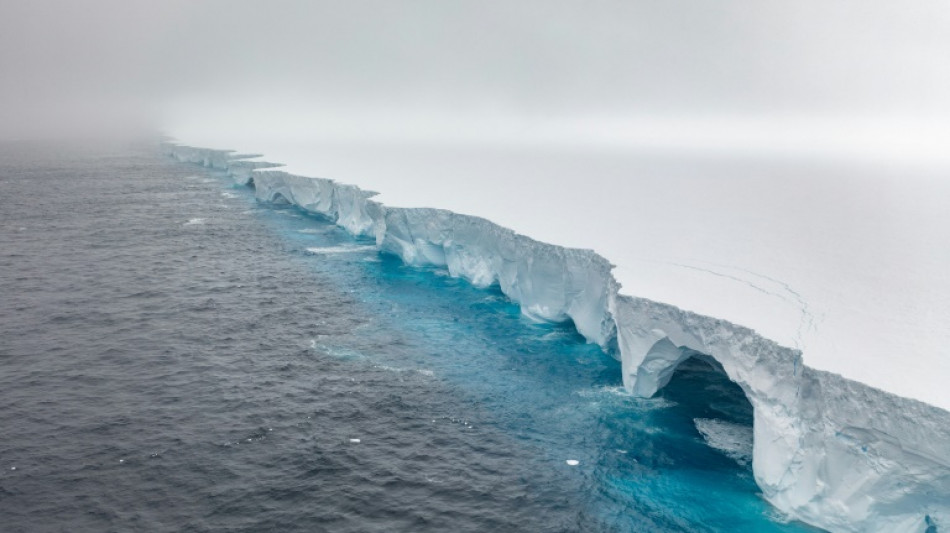
-
 Iran-US talks expected Thursday despite fears of strikes
Iran-US talks expected Thursday despite fears of strikes
-
Milan beaten by Parma, Napoli rage at officials

-
 Hughes looses teeth then scores Olympic gold-winning goal for USA
Hughes looses teeth then scores Olympic gold-winning goal for USA
-
Eze and Gyokeres destroy Spurs to boost Arsenal title bid

-
 Arsenal's Eze sinks Spurs again, Liverpool late show floors Forest
Arsenal's Eze sinks Spurs again, Liverpool late show floors Forest
-
Galthie praises France lock Meafou and defence

-
 'Nothing was good', says Mac Allister despite Liverpool win
'Nothing was good', says Mac Allister despite Liverpool win
-
USA defeat Canada for Olympic men's ice hockey gold, Trump celebrates

-
 EU 'expects' US to honour trade deal as Trump hikes tariffs
EU 'expects' US to honour trade deal as Trump hikes tariffs
-
'GOAT' battles to top of N. America box office

-
 South Africa thrash India to end 12-match T20 World Cup win streak
South Africa thrash India to end 12-match T20 World Cup win streak
-
Bielle-Biarrey breaks record as France beat Italy in Six Nations

-
 US says trade deals in force despite court ruling on tariffs
US says trade deals in force despite court ruling on tariffs
-
Barcelona back top of La Liga with Levante win

-
 Gu strikes gold, USA beat Canada in men's ice hockey
Gu strikes gold, USA beat Canada in men's ice hockey
-
What's behind England's Six Nations slump?

-
 Napoli rage at officials after loss at Atalanta
Napoli rage at officials after loss at Atalanta
-
Liverpool late show floors Nottingham Forest

-
 Rimac Nevera R: Beyond imagination
Rimac Nevera R: Beyond imagination
-
USA beat Canada to win men's Olympic ice hockey gold

-
 Samardzic seals comeback win for Atalanta over Napoli
Samardzic seals comeback win for Atalanta over Napoli
-
Eileen Gu switches slopes for catwalk after Olympic flourish

-
 Luce: Ferrari's ingenious electric revolution
Luce: Ferrari's ingenious electric revolution
-
Miller guides South Africa to 187-7 against India

-
 Scotland boss 'proud' of comeback Six Nations win over Wales
Scotland boss 'proud' of comeback Six Nations win over Wales
-
Iranian students rally for second day as fears of war with US mount

-
 US Secret Service kills man trying to access Trump Florida estate
US Secret Service kills man trying to access Trump Florida estate
-
Coventry 'let the Games do their magic': former IOC executives

-
 Cayenne Turbo Electric 2026
Cayenne Turbo Electric 2026
-
Sri Lanka have to qualify 'the hard way' after England drubbing

-
 Doris says Six Nations rout of England is sparking Irish 'belief'
Doris says Six Nations rout of England is sparking Irish 'belief'
-
Thousands of pilgrims visit remains of St Francis

-
 Emotional Gu makes history with Olympic freeski halfpipe gold
Emotional Gu makes history with Olympic freeski halfpipe gold
-
Impressive Del Toro takes statement victory in UAE

-
 Gu wins triumphant gold of Milan-Cortina Olympics before ice hockey finale
Gu wins triumphant gold of Milan-Cortina Olympics before ice hockey finale
-
England rout Sri Lanka for 95 to win Super Eights opener

-
 Underhill tells struggling England to maintain Six Nations 'trust' as Italy await
Underhill tells struggling England to maintain Six Nations 'trust' as Italy await
-
Alfa Tonale 2026: With a new look

-
 BMW 7 Series and i7: facelift in 2026
BMW 7 Series and i7: facelift in 2026
-
Eileen Gu makes history with Olympic freeski halfpipe gold

-
 Eileen Gu makes history with Olympic halfpipe gold
Eileen Gu makes history with Olympic halfpipe gold
-
Morocco flood evacuees mark muted Ramadan away from home

-
 Lucid Gravity 2026: Test report
Lucid Gravity 2026: Test report
-
Sri Lanka restrict England to 146-9 in T20 World Cup Super Eights

-
 West Indies wary of Zimbabwe's 'X-factor' quick Muzarabani
West Indies wary of Zimbabwe's 'X-factor' quick Muzarabani
-
Bentley: Visions for 2026

-
 Eileen Gu wins Olympic gold in women's freeski halfpipe
Eileen Gu wins Olympic gold in women's freeski halfpipe
-
First 'dispersed' Winter Olympics a success -- and snow helped

-
 Six stand-out moments from the 2026 Winter Olympics
Six stand-out moments from the 2026 Winter Olympics
-
Andrew's arrest hands King Charles fresh royal crisis


World's biggest iceberg 'battered' by waves as it heads north
It was impossible to see through the snow and fog on the Antarctic seas but expedition leader Ian Strachan knew his ship was approaching a true behemoth: the world's biggest iceberg lay somewhere ahead.
"Then the clouds lifted and we could see this expansive -- almost abstract -- white line that extended each way across the horizon," he told AFP.
As the ship got closer during its visit on Sunday, huge gaping crevasses and beautiful blue arches sculpted into the edge of the iceberg came into focus.
Waves up to four metres (13 feet) high "smashed" and "battered" its wall, breaking off small chunks and collapsing some arches, Strachan said.
He compared sailing along the endless jagged edge to looking at sheet music. "All the cracks and arches were different notes as the song played."
The tooth-shaped iceberg named A23a is nearly 4,000 square kilometres (1,550 square miles) across, making it more than twice the size of Greater London.
After three decades stuck to the Antarctic ocean floor, the iceberg is now heading north on what could be its final journey.
It contains an estimated one trillion tonnes of fresh water that is likely to melt off into the ocean along way.
The iceberg, which is up to 400 metres thick in places, is currently drifting between Elephant Island and the South Orkney islands.
- 'Magical' -
Strachan was speaking to AFP as his ship, run by the expeditions firm EYOS, was wrapping up a private tour of the Antarctic Peninsula.
It had been planning to go to South Georgia island but due to a bird flu outbreak there, it visited A23a instead.
It was not the first ship to witness the majesty of the iceberg.
The UK's RRS Sir David Attenborough was travelling to Antarctica on a scientific mission last month, when it found the A23a blocking its path.
Andrew Meijers, the chief scientist on board, said that when they approached the iceberg, the mist parted, the sun came out and a pod of orcas even swam past.
"It was really magical," Meijers told AFP.
"It took us six hours to steam past it," he added.
A23a first broke off the Antarctic coast back in 1986, making it the world's oldest iceberg, as well as its largest.
But it quickly became stuck to the ocean floor, where it languished for decades.
Andrew Fleming of the British Antarctic Survey told AFP that in 2020 he saw satellite images suggesting it was "wobbling".
Then late last year, A23a broke free from its icy shackles and started venturing north.
Whether or not this was caused by climate change -- winter Antarctic sea ice reached its lowest level on record last year -- remains an open question.
Fleming emphasised that these icebergs are a natural process, adding that one or two big ones break off every year.
"It's more likely that it's time had just come," he added.
But he emphasised that such icebergs are "part of a huge system that is changing dramatically".
- 'Lumbering beast' -
This "lumbering beast" moves slower than walking pace, Fleming said.
"The Titanic would've spotted this one coming."
Since breaking free, A23a has followed roughly the same path as previous massive icebergs A68 and A76, moving past the east side of the Antarctica Peninsula through the Weddell Sea along a route called "iceberg alley".
As the iceberg is "ejected out into the Southern Ocean", warmer waters and bigger waves will start to break it up, Fleming said.
If it follows the path of the two comparably huge previous icebergs, it will travel northeast towards the island of South Georgia, a haven for wildlife including penguins and seals.
There is a slight fear that if the iceberg parks itself near the island, it could block these animals from getting to where they normally forage, threatening their ability to feed themselves.
But this is not expected to happen.
A68 instead broke up into smaller chunks, causing a problem not for animals but humans, making it difficult for fishing ships to navigate the area, Meijers said.
A more likely path would be for A23a to move around the island and continue meandering northwards.
A rare few icebergs have made it so far that they have been spotted from the Brazilian coast.
But eventually A23a will meet the fate of all icebergs that journey north -- melting away in warmer waters.
"Ultimately, they're doomed," Fleming said.
M.A.Colin--AMWN



